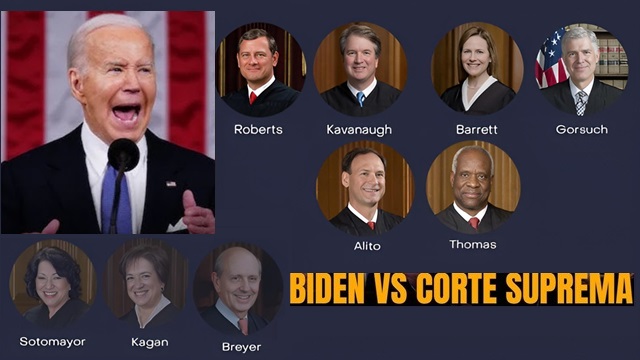 Biden and Kamala Seek To Control the Judiciary by Modifying the U.S. Supreme Court
Biden and Kamala Seek To Control the Judiciary by Modifying the U.S. Supreme Court
Democrats want to control the Supreme Court
Joe Biden and Kamala Harris decided they were willing to destroy the Supreme Court to undermine its legitimacy and the rule of law. Why? Because it is the one branch of government they don't control at the moment and they are angry that the justice is willing to uphold the constitution and defend the protection of all, generating an intense debate about the limits of executive power and the independence of the judiciary.
They want to have totalitarian control of the executive, legislature and judiciary in the style of the dictatorships in Cuba, Nicaragua and Venezuela.
The Democrats want to make changes to the US Supreme Court. They want to establish term limits for judges and a code of ethics. They also want to limit presidential immunity. All this is because they do not agree with the decisions made by the Supreme Court that have not favored their hegemonic policies to implement their Marxist-like totalitarian regime.
Biden's Proposals
President Biden has proposed changes to the Supreme Court, but fortunately, they are unlikely to be approved by Congress. All of the changes proposed by the Democratic leadership seek to eliminate the rule of law by controlling the judiciary, as the other two branches already have it under control, using the federal agencies as political arms of the Biden-Obama-Kamala regime, to persecute the political opposition of the Republicans.
The last days of Biden
The White House is trying to make changes before Biden's term ends. They want to impose laws and make the Supreme Court different. Conservatives disagree with these changes as they are attacking traditional American values to ultimately bring about constitutional changes that favor their clearly Marxist agenda.
Biden's proposed changes
- Eliminate the presidential immunity granted to presidents by the Supreme Court: Biden proposes a constitutional amendment that would remove immunity for crimes committed by former presidents while in office. Such a move, critics say, could be a "shot in the foot" for Biden himself, considering the ongoing investigations into the corruption of Biden and his family.
- Establish term limits for judges: A system is proposed where each president would appoint one justice every two years, with a limit of 18 years of service on the Supreme Court. This measure seeks to address what Democrats perceive as an imbalance in the current composition of the court, which has a majority of conservative justices, to increase the number of justices who share their ideology.
- Implement a binding code of conduct: Biden suggests creating a mandatory code of ethics for all Supreme Court justices, arguing that there is no reason for the highest court to be exempt from such regulations. He wants to require justices to disclose gifts, refrain from public political activities, and recuse themselves from cases in which they or their spouses have financial or other conflicts of interest.
These proposals have been labelled by many commentators as a partisan "tantrum", especially considering that Biden will not seek re-election. Critics argue that these measures undermine the independence of the judiciary and represent an attempt to "trample on the Constitution".
The announcement has raised concerns about the motivation behind these reforms, as they respond more to political frustrations than genuine institutional needs. Vice President Kamala Harris, a presidential candidate, has expressed her support for the proposals.
These changes come a week after Biden ended his re-election bid and endorsed Vice President Kamala Harris to face Republican presidential nominee Donald Trump in November.
It also comes after the Supreme Court ruled that there is no constitutional right to abortion and other decisions that blocked Biden's agenda on immigration, student loans, vaccine mandates, and climate change.
As Biden prepares to end his term and flatten the path to Kamala's presidency, the debate continues over whether these reforms are necessary to modernize the judiciary or whether they pose a threat to the fundamental principles of American democracy.
José Tarano is a technical producer, graphic designer, collaborator, and researcher at Patria de Martí ► and The CubanAmerican Voice ►. He holds a bachelor’s degree in Electrical Engineering in Telecommunications from José Antonio Echeverria Superior Polytechnic Institute (ISPJAE). In addition, he is the founder and director of Electronics JR Computer Design and Service ►, a computer and information technology services company. Originally from Santiago de las Vegas, Havana, Cuba, he currently resides in the United States.


 🖋️Author Jose Tarano
🖋️Author Jose Tarano